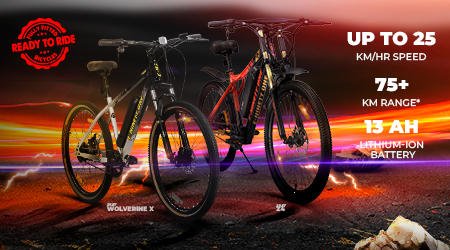Why Electric Cycles Are the Future of Eco-Friendly Commuting

Introduction
The global conversation about climate change has focused attention on sustainable transportation options. Among these, electric cycles, often known as e-cycles, have emerged as game changers. E-cycles, which combine technology and simplicity, provide an economical, environmentally responsible, and versatile method to overcome the obstacles of modern travel. Whether you're commuting to work or going for a leisurely ride, Electric Cycles are becoming increasingly popular as the future of urban mobility.
The Need for Sustainable Commuting Options
The Environmental Challenges Posed by Traditional Vehicles
Traditional gasoline-powered vehicles are significant contributors to carbon emissions. The environmental cost of having millions of cars on the road across the world is enormous. Air pollution, greenhouse gas emissions, and resource depletion are just a few of the serious problems caused by these cars.
Urban Congestion: Solutions
Traffic congestion affects cities throughout the world, wasting time, fuel, and increasing pollutants. Best electric cycles are a realistic alternative that allows commuters to avoid traffic while also contributing to a greener environment.
Importance of Reducing Carbon Footprint
Adopting low-carbon transportation solutions is no longer a luxury; it is a requirement. Electric bicycles online, with their low energy consumption, provide a tangible opportunity for people to minimize their carbon footprints and help combat climate change.
Environmental Benefits
The environmental benefits of electric cycles are one of the strongest reasons to use them. Unlike cars and motorcycles, which utilize fossil fuels and release harmful greenhouse gases, e-bikes run on rechargeable batteries and emit zero emissions when in operation. Individuals can dramatically reduce their carbon footprint by switching from driving to riding an e-bike.
Furthermore, e-bikes have fewer manufacturing and energy requirements than electric cars. This makes e-bikes a more sustainable option throughout their entire existence, from manufacturing to disposal. Promoting the usage of electric cycles is an effective strategy for communities to reduce overall transportation emissions while still meeting carbon neutrality targets.
Cost-Effective Commuting
E-bikes are also a cost-effective solution for many commuters. The first expense of an electric cycle may appear exorbitant when compared to a standard bicycle, but the long-term benefits quickly outweigh the upfront costs. E-bikes are far less expensive to operate than automobiles or motorcycles because they do not require fuel, lengthy maintenance, or costly repairs. Charging an e-bike battery is also relatively inexpensive, generally costing only a few cents for a full charge.
Furthermore, e-bikes eliminate costs related to parking, tolls, and public transportation fares. In some areas, governments even provide subsidies or tax breaks for buy electric cycles, substantially easing the financial strain on customers.


Improved Accessibility and Convenience
One of the most significant barriers to cycling as a primary form of transportation is the physical effort required, particularly over longer distances or in mountainous locations. Electric bikes address this issue by providing pedal-assist and throttle features, making cycling less physically demanding. Riders can select the level of support they require, allowing them to travel comfortably without becoming weary or overheated.
E-bikes can bridge the gap for persons of different fitness levels, age groups, and physical capacities. Because of their inclusivity, they are a feasible mode of transportation for a wider range of people. Furthermore, advances in battery technology allow modern e-bikes to travel considerable distances on a single charge, making them appropriate for both short urban commutes and lengthy suburban travels.
Reducing Urban Congestion
Traffic congestion is a continuous problem in cities worldwide, causing commuters to spend time, pollute the air, and experience increased stress. Electric bicycles provide a practical answer by allowing riders to travel through traffic more effectively. Their small size enables them to use bike lanes and other routes, decreasing the total demand for road infrastructure.
As more people switch to e-bikes, communities may see a significant decrease in the number of cars on the road. This change not only reduces traffic congestion but also makes the urban environment safer and more enjoyable for both walkers and bicycles.
Health and Lifestyle Benefits
While electric cycles reduce the physical effort required for cycling, they nonetheless promote physical exercise, especially when employing pedal-assist modes. This makes e-bikes a good choice for anybody wishing to add moderate exercise to their regular routines. Regular usage of an e-bike can improve cardiovascular health, boost mental well-being, and encourage a more active lifestyle.
Furthermore, e-bike commuting can save time compared to traditional riding or public transit, offering riders more freedom in their daily schedules. The convenience and fun of riding an e-bike contribute to a less stressful commute, which can have a good impact on overall quality of life.
A Growing Trend
The popularity of the Best e-bicycle is growing significantly. According to market studies, worldwide e-bike sales are expected to increase drastically in the future years. This expansion is being driven by technological breakthroughs, lower battery costs, and growing awareness of the environmental and economic benefits of e-bikes.
Governments and municipal planners are also realizing electric cycles' potential to alter urban mobility. Many communities are investing in dedicated bike lanes, charging stations, and bike-sharing programs to encourage e-bike usage. These measures not only make e-bikes more accessible, but they also represent a change toward sustainable transportation regulations.


Challenges and the Road Ahead
Despite its many advantages, electric bicycles confront several problems. High upfront expenditures, limited infrastructure, and concerns about battery recycling are just a few of the challenges that must be addressed. However, continued progress in e-bike technology and supportive government legislation are projected to overcome these barriers in time.
Companies, for example, are attempting to create lighter, more efficient batteries with longer lifespans and more recyclability. Cities are simultaneously expanding bike-friendly infrastructure and providing incentives to boost e-bike usage.
How E-Cycles Contribute to Urban Mobility Goals
Integration with Public Transport Systems
Best E-cycles supplement public transportation systems by offering a handy last-mile connectivity solution. Riders can take their foldable e-cycles on buses, trains, or metros to complete their journey easily.
Improved Last-Mile Connectivity
The convenience of e-cycles addresses the issue of last-mile connectivity, which is sometimes a barrier for public transportation users. This increases total urban mobility efficiency.
Reducing Traffic Congestion
Best e-bikes in India help to ease traffic congestion by reducing the number of cars on the roads. This not only saves time but also lowers air pollution in densely populated regions.
Future Trends in Electric Cycles
AI-Powered Safety Features
To improve rider safety, artificial intelligence is being integrated into electric bicycles, with capabilities such as collision detection, automated braking, and real-time traffic notifications.
Lightweight Materials and Innovative Designs
Advances in materials research are enabling the development of lightweight yet durable e-cycles, enhancing portability and overall performance.


Growth in Country and Residential Areas
While e-bikes are now more popular in cities, their use is spreading to rural and suburban regions, where they provide an inexpensive and efficient form of mobility.
Tips for Choosing the Right Electric Cycle
Factors to Consider: Battery Life, Motor Power, and Weight
When choosing an e-cycle, consider its battery range, motor power, and overall weight to ensure it fulfills your commuting requirements.
Understanding Local Laws and Regulations
Familiarize yourself with local e-cycle rules, such as speed limits, helmet requirements, and lane limitations.
Evaluating Personal Needs and Budget
Consider your specific needswhether for commuting, leisure, or deliveryand select a model that fits your budget and preferences.
Conclusion
Electric bicycles are transforming sustainable and efficient transportation. These e-cycles, which provide environmental, economic, and health benefits, are changing the way we commute. With technological breakthroughs and improved infrastructure, Ninety One e-cycles are paving the road for greater acceptance, making them an essential component of environmentally sustainable and future-ready commuting options. Experience the journey of tomorrow today!
FAQs
1. Are electric bicycles better for the environment than electric vehicles?
Yes, e-cycles are more energy efficient, require fewer resources to create, and emit zero emissions when used.
2. How long does the average e-cycle battery last?
Most e-cycle batteries last between three and five years, depending on usage and maintenance.
3. Are electric bicycles best for long-distance travel?
While they are best suited for short to medium journeys, certain high-end models with extended battery life may travel longer distances.
4. What is the typical price for an electric cycle?
E-cycle prices range between Rs.24,999/- to Rs. 37,999/-, depending on features, brand, and build quality.
5. Can electric bicycles replace traditional modes of transportation?
E-cycles can replace many short and medium-distance rides, but their viability is dependent on individual requirements and infrastructure availability.
- Electric Cycles
- Eco-Friendly Commuting
- urban mobility
Related Blogs

Electric Bicycle
All You Need To Know About Maintaining Your E-BikeThese tips will help us take care of our electric cycles and ensure their longevity. Let's go over them.

New Cycle Launches
Ninety One Cycles’ Latest Launches Will Steal Your HeartWe present to you three new launches at Ninety One Cycles. Each of these bicycles is power packed with features and offer us beautiful riding experiences.

Electric Scooters
Introducing the New XE Model – The Future of Ninety One E-Scooters!The electric scooter market continues to grow, and Ninety One's new XE series marks an advance into that future. This latest addition contains two innovative designs, the XE1 and XE2.
